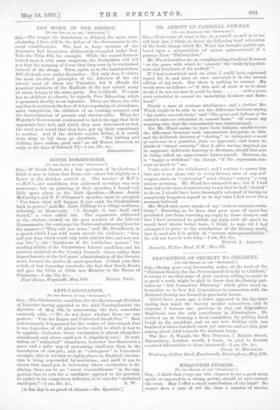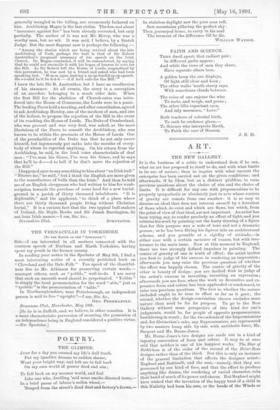MISQUOTED STORIES.
[To THE EDITOR OF TUE " SPECTATOR.44]
think that every one who chances to see a good story spoilt, or imputed to a wrong parent, should at once correct the error. May I offer a small contribution of the kind P No sooner does a man of it die, than a number of stories,
generally mangled in the telling, are erroneously fathered on him. Archbishop Magee is the last victim. The bon-mot about
"insurance against fire" has been already corrected, but only partially. The author of it was not Mr. Merry, who was a worthy man, but no wit. It was said, I believe, by a Scotch Judge. But the most flagrant case is perhaps the following :—
"Among the stories which are being revived about the late Archbishop of York, perhaps the best is that of Sir Robert Anstruther's pregnant summary of his speech on the Irish Church. Dr. Magee concluded, it will be remembered, by saying that he could not reconcile it with his hopes of heaven to vote for the Bill. As Sir Robert left the House of Lords, magnetised by this peroration, he was met by a friend and asked who had been speaking last. M-m-m agee, making a sp-sp-lendid sp-sp-speech. He s-s-said he'd be d d-d—d if he'd vote for the Bill.'
I knew the late Sir R. Anstruther, but I have no recollection of his stammer. At all events, the story is a corruption of an anecdote belonging to a much older date. When the first Bill for the abolition of Church-rates was intro- duced into the House of Commons, the Lords were in a panic.
The leading Peers held a meeting, and after consultation, agreed to ask Archbishop Howley, one of the meekest of men, and one of the holiest, to propose the rejection of the Bill in the event of its reaching the House of Lords. The Duke of Cumberland, who was present and was very deaf, was asked, as the most illustrious of the Peers, to consult the Archbishop, who was known to be within the precincts of the House of Lords. One of the peculiarities of the Duke was that he not only swore himself, but ingenuously put oaths into the mouths of every- body of whom he reported anything. On his return from the Archbishop, he said, in the loud voice characteristic of deaf men : "I've seen his Grace, I've seen his Grace, and he says that he'll be d—d to hell if he don't move the rejection of the Bill."
I happened once to say something to him about " an Irish bull." " Excuse me," he said, " but I think the English are more given to the manufacture of bulls than the Irish." And then he told me of an English clergyman who had written to him for a sub- scription towards the purchase of some land for a new burial- ground in a parish of thirty thousand inhabitants. " It is deplorable," said the applicant, " to think of a place where there are thirty thousand people living without Christian burial," It is a curious fact that the two typical bull-makers of Ireland, Sir Boyle Roche and Sir Jonah Barrington, do not bear Irish names.—I am, Sir, &o.,



































 Previous page
Previous page